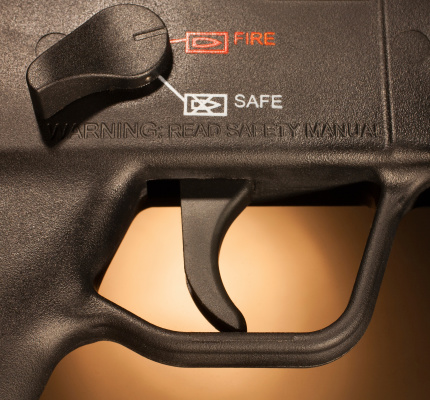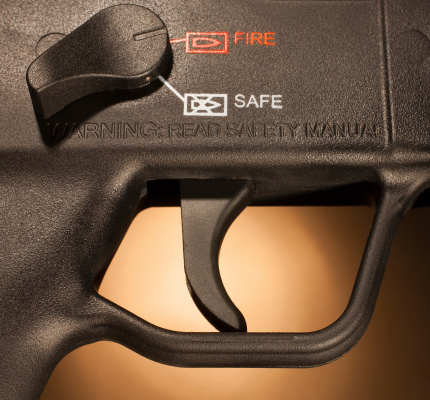General
Are Gun Accidents “Rare”?

Decades ago, it seemed the only gun incidents that happened were either intentional with a specific purpose or target in mind or an “accident”, such as a misfired gun while cleaning it or while hunting with friends. The stories seemed cut and dry. The shooter was a gun owner, the story matched up, and the rest acted as a lesson to learn from. Today’s gun incidents are complex, as they are driven by instability, anger, and carelessness.
There is a fine, and perhaps blurred, line between an intentional incident and a firearm accident. As we, as everyday citizens, become more privy to the grisly details of a gun incident, intentional or accidental, it becomes more personal and we react. Whether or not we fall in the “deserved what they got” category or are brought to tears by another gun incident, guns are prevalent in our society and don’t seem to be going away any day soon. Gun incidents are not new and maybe the incidents have been this convoluted all along.

What “The Pro” and “The Against” Say, Will They Ever Come to an Agreement?
When it comes to actual firearm related statistics, gun advocates and gun protestors shouldn’t argue the validity of a number, but they do. They question the sources and often in their own reporting, they may skew their findings. Disagreements aside, gun incidents, fatal and non-fatal, in our country are all too real and happening daily; all too tragically and always preventable. According to the Centers for Disease Control and Prevention (CDC), approximately over 30,000 deaths occur in the U.S. due to homicides, suicides, and unintentional shootings. If that number isn’t startling enough, break it down like this. More than 85 deaths occur each day, which equals to more than 3 deaths each hour and all because of a firearm. In 2010, 606 people were killed due to an accidental shooting, and in a five year period, over 3,5000 people died from unintentional shootings.
While the majority of gun-related deaths are a result of malicious intent, there is no clear explanation for the percentage of preventable, accidental firearm incidents. Gun naysayers urge the removal of guns from homes, especially with young children. Gun supporters argue that a home, and the young children in it, cannot be protected without the ownership of a gun. It can be fair to assume, however, that both sides of the gun debate would and do agree that if guns are present in a home, gun safety must be practiced.
Decrease the Accident, Observe Safety
Obviously the easiest way to prevent a gun accident in your own home is to not own a gun in the first place, but hunting enthusiasts and Second Amendment supporters more than likely own a couple of firearms. Despite the urgent desire for safety, the truth is that a gun present in the home increases the risk of accidental gun incidents, as well as homicides and suicides. Children, who live in homes with loaded and unlocked guns, are more likely to be injured or killed by that same gun. According to the Children’s Defense Fund, 22% of children with gun-owning parents handled guns in their homes without their parents’ knowledge. In a study from the American Academy of Pediatrics, one third of 8 to 12 year old boys, who came across a handgun, pulled the trigger (not knowing if the gun was loaded or unloaded). Because children are curious and at highest risk of becoming both the victim and perpetrator of a firearm accident, parents and/or authorities must make gun safety discussion a priority. Failure to have the potentially life-saving discussion could result in a tragic mistake.
If guns are present in the home, they must be locked up. A gun stored in an unlocked safe protects no one. According to the American Journal of Public Health, 43% of homes with guns and kids have at least one unlocked firearm. Many parents feel like if they try to “outsmart” their child by simply hiding a gun, but they may as well keep the gun out in the open, as children are pretty good at finding things (think “Hide-n-Seek”). Children should be taught, at any early age, that guns are dangerous and if they see a gun they should never touch the gun, but rather leave the area and tell a grown-up right away. If parents decide that they’d like introduce firearms into their child’s life, such as hunting, gun safety should be the number one priority. Remember, firearm accidents can happen to even the skilled marksmen.
Gun deaths are a problem in the United States. While some civilians want to revert back to the old gun slingin’ days, others want guns banished for good. Many argue that guns are not the problem, but rather the people who own them. While there is some truth to that statement, how do we explain the inexperienced and unintentional hands that guns find their way to? When gun advocates argue that firearm accidents are rare, one may think “rare” as in infrequent or every so often, but does over 600 deaths sound “rare”?
-

 Tech11 years ago
Tech11 years agoCreating An e-Commerce Website
-

 Tech11 years ago
Tech11 years agoDesign Template Guidelines For Mobile Apps
-

 Business6 years ago
Business6 years agoWhat Is AdsSupply? A Comprehensive Review
-

 Business10 years ago
Business10 years agoThe Key Types Of Brochure Printing Services
-

 Tech8 years ago
Tech8 years agoWhen To Send Your Bulk Messages?
-

 Tech5 years ago
Tech5 years ago5 Link Building Strategies You Can Apply For Local SEO
-

 Law5 years ago
Law5 years agoHow Can A Divorce Lawyer Help You Get Through Divorce?
-

 Home Improvement6 years ago
Home Improvement6 years agoHоw tо Kеер Antѕ Out оf Yоur Kitсhеn































